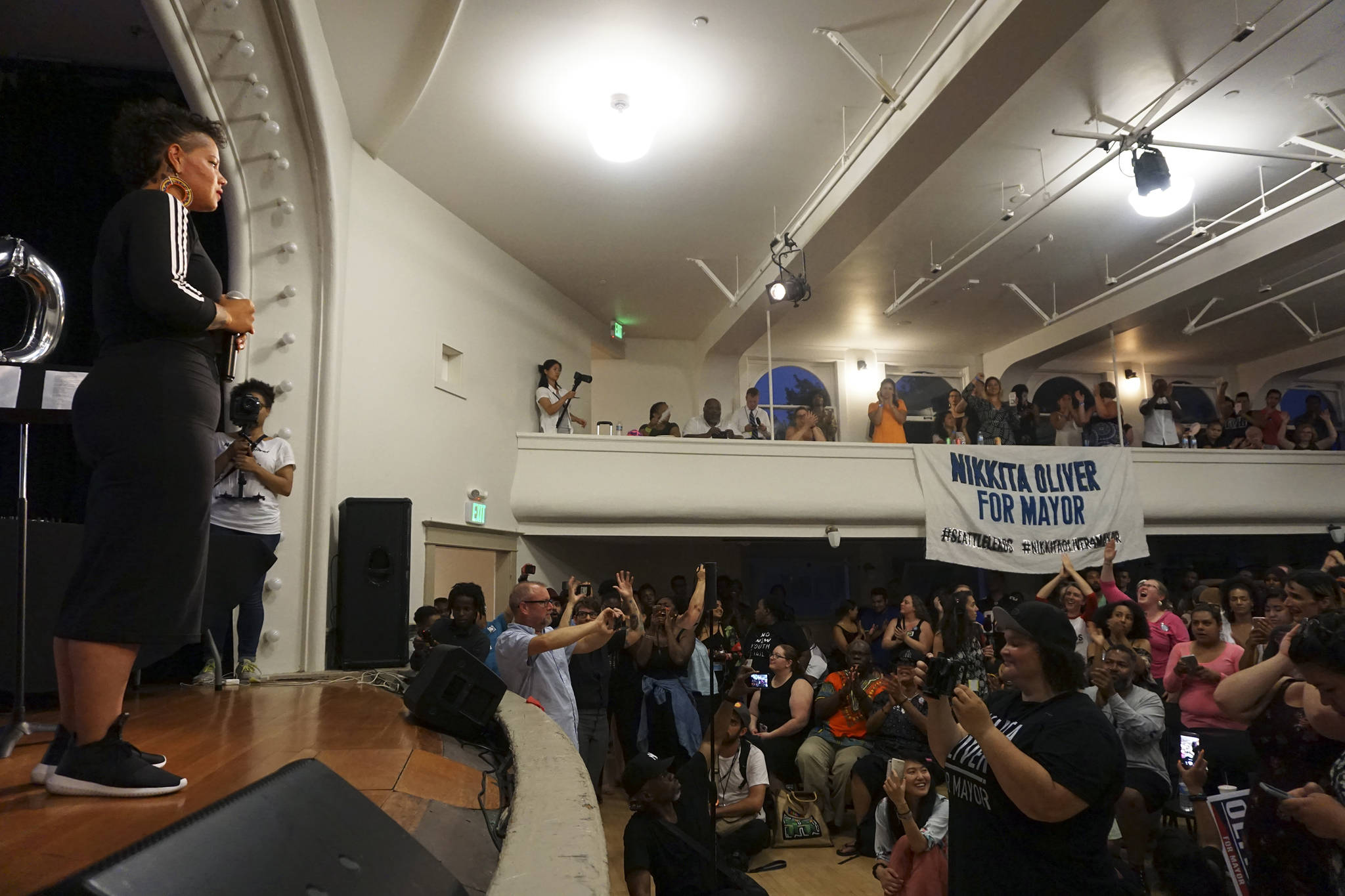On Tuesday evening at the Cyclops Cafe & Lounge in Belltown, flushed and eager Cary Moon supporters clutched their “Cary Moon for Mayor” signs. As the first ballots dropped, they cheered: Moon stood in second place with 15.56 percent of the vote. Moon herself mouthed “wow” and called the whole thing “surreal.” If that drop were the only drop, she would certainly advance to the general election in November.
But with about half of ballots counted out of a 38 percent projected voter turnout in King County, a lot could change in a few days. Moon deliberately did not declare a premature victory, since runner-up Nikkita Oliver trails her by a slim margin, at 13.9 percent. “I’ll just be frank,” Moon told the room. “Nikkita’s numbers are going to rise. I will not be surprised if Nikkita overtakes me.” And while a late Wednesday update to the count extended Moon’s lead, no one is yet counting Oliver out.
Meanwhile, following other election-night parties, other assumptions were made. City Council Position 8 candidates Teresa Mosqueda and Jon Grant secured a healthy lead over the majority of their opponents, but Fremont Brewing owner Sara Nelson, considered the “business candidate” (hence the more right-wing, though she strongly begs to differ) currently trails Grant by an even slimmer margin than Oliver does Moon—23.13 percent to Grant’s 24.29. (Those numbers had shifted ever so slightly by the end of the day Wednesday, showing Nelson gain on Grant by two-tenths of a percent). This race too is, technically, too close to call. But that didn’t stop some Grant supporters from calling it for their candidate:
.@DemSocialists member @electjongrant is headed into the general election pic.twitter.com/g2n91ygFFL
— Seattle DSA🌹 (@SeattleDSA) August 2, 2017
A headline in the Seattle Times suggests as much, declaring that “Mosqueda and Grant appear headed toward November runoff for Seattle City Council.”
Why was Moon so cautious and Grant’s base so confident? Politicos say it’s due to a time-tested truism of Seattle politics: Late votes break left.
Former Mike McGinn staffer and current civic pundit Sol Villarreal, speaking at the McGinn election night party at Plum Bistro, reiterated the conventional wisdom he offered Seattle Weekly in 2015, following the neck-and-neck City Council race between then-candidates Lisa Herbold and Shannon Braddock: “People stop paying attention after two days,” he said, but then “there’s an enormous swing in favor of the more progressive candidate. In this case, [frontrunner Jenny] Durkan is gonna lose votes—she’s at 30 [percent] now, but she’ll be below 30 by the time it’s finished. Moon and Oliver will probably both pick up votes, but I think Oliver is gonna pick them up at a [huge] rate. Her vector is gonna be much stronger than Moon’s. That’s my prediction: The late-breaking votes are going to go to Oliver, overwhelmingly.”
The fact, on the other hand, that Nelson has earned the title of “business candidate” in the Position 8 race makes her bid radioactive to a certain segment of lefty voters. Under Villarreal’s reading, that would put her at a disadvantage.
So far, that hasn’t happened. But lest the non-news of the Wednesday afternoon drop sway you, it sounds like those votes are not the late ones; a spokesperson for King County Elections told Crosscut that no votes from the Tuesday drop came from dropboxes and Wednesday’s was mostly catching up on the mail-in ballots they didn’t have a chance to count on Tuesday.
The idea that later votes lean left is well supported by recent city elections.
In 2013, then-candidate and hard-left socialist Kshama Sawant was running against moderate Richard Conlin; Conlin initially led by seven percentage points, then lost to Sawant by a hair. In 2015, Herbold, thought to be more liberal than Braddock, also gained on Braddock and beat her in the late counts. The race was also extremely tight that year between Council incumbent Bruce Harrell and the leftier Tammy Morales; she gained on him in the late counts, and lost by just 400 votes. McGinn, though he lost the mayoral race in 2013, gained some 11 percentage points on Ed Murray following election night, Villarreal said.
One reason for that is because the late-voters tend to be younger voters, and younger voters tend to be the progressive ones. Are young voters procrastinators? Are they busier? Do they rely more on last-minute social media pushes these days? Regardless of the deeper reasoning, everyone in Seattle seems to call the late-left a real phenomenon, because it seems to bear out in the data, again and again.
So, in the next few days, or possibly weeks, we can expect to watch the race shift, and then, quite possibly, shift again. But what seems quite clear at the moment is that, no matter what, Seattle will elect the first woman the city has seen as mayor in nearly a century.
And chances are, depending on how you draw the scale, you’d be able to call her liberal.
“Whether [Oliver] is in second or I’m in second,” Moon told her supporters at the Cyclops, “I’m really excited to work on it together and take on the establishment party however we can. It’s going to take all of us.”
In the same vein, Oliver told her base: “Stop checking your phones. As much as the vote matters, the movement matters more.”
sbernard@seattleweekly.com
This post has been updated.








